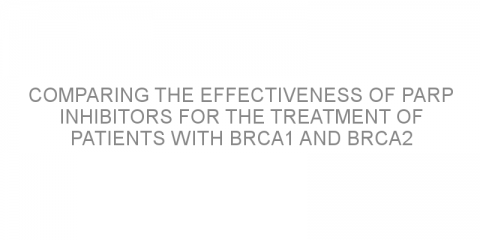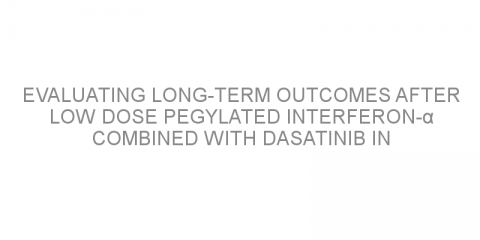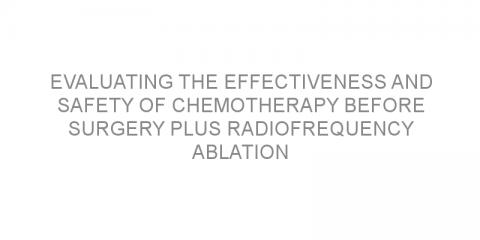In a nutshell This study compared the effectiveness and safety of first-line treatment options in patients with advanced ALK-rearranged non-small-cell lung cancer (NSCLC). The data showed that alectinib (Alecensa) and lorlatinib (Lorbrena) were the most effective and safest first-line treatment options for these patients. Some background...
Read MoreTreatment Posts on Medivizor
Comparing the effectiveness of PARP inhibitors for the treatment of patients with BRCA1 and BRCA2 mutations.
In a nutshell This study compared the effectiveness of PARP inhibitors for the treatment of patients with BRCA1 and BRCA2 mutations in solid tumors. The data showed that PARP inhibitors could benefit both patients with BRCA1 and BRCA2 mutations with similar effectiveness. Some background BRCA1 and BRCA2 gene mutations (abnormalities) can be found in...
Read MoreComparing the effectiveness of PARP inhibitors for the treatment of patients with BRCA1 and BRCA2 mutations.
In a nutshell This study compared the effectiveness of PARP inhibitors for the treatment of patients with BRCA1 and BRCA2 mutations in solid tumors. The data showed that PARP inhibitors could benefit both patients with BRCA1 and BRCA2 mutations with similar effectiveness. Some background BRCA1 and BRCA2 gene mutations (abnormalities)...
Read MoreEvaluating the effectiveness and safety of maintenance strategies after first-line treatment with anti-EGFR plus doublet chemotherapy regimen in real-world patients with left-sided RAS/BRAF wild-type metastatic colorectal cancer.
In a nutshell This study evaluated the effectiveness and safety of maintenance strategies after first-line treatment with anti-EGFR (epidermal growth factor receptor) plus doublet chemotherapy regimen in real-world patients with left-sided RAS/BRAF wild-type metastatic colorectal cancer (mCRC). The data showed that maintenance therapy with 5-fluorouracil...
Read MoreUsing focal thermo-ablative therapy for treating oligo-recurrent prostate cancer after radiotherapy.
In a nutshell This study assessed patient responses to focal thermo-ablative therapy (FTA) for oligo-recurrent prostate cancer (PCa) after pelvic radiotherapy. The data suggested that FTA therapy is a good option in these patients. Some background Oligometastatic PCa means that cancer has spread to only a few places (up to 5 metastases). It...
Read MoreCan combined therapy with sodium-glucose co-transporter 2 inhibitors and sulfonylureas affect the risk of hypoglycemia in patients with type 2 diabetes?
In a nutshell This review assessed the risk of hypoglycemia (dangerously low blood glucose) with the addition of sodium-glucose co-transporter 2 (SGLT-2) inhibitors to sulfonylureas in patients with type 2 diabetes (T2D). The authors concluded that this combination was associated with an increased risk of hypoglycemia. Some background...
Read MoreIs AADC gene therapy a valuable option for patients with moderately advanced Parkinson Disease?
In a nutshell In this work, the authors studied whether VY-AADC01 (NBIb-1817) gene therapy was safe and effective in patients with moderately advanced Parkinson's disease (PD) patients with motor fluctuations. The authors showed that this treatment caused an improvement in motor function, quality of life, and a decrease in the level of...
Read MoreInvestigating minimal residual disease and long-term outcomes in patients with chronic lymphocytic leukemia who have been treated with venetoclax-obinutuzumab
In a nutshell This study aimed to investigate minimal residual disease (MRD) and long-term outcomes of patients with chronic lymphocytic leukemia (CLL) who were treated with venetoclax (Venclexta) and obinutuzumab (Gazyva). This study concluded that this treatment leads to an effective MRD reduction and has...
Read MoreEvaluating long-term outcomes after low dose pegylated interferon-α combined with dasatinib in patients with chronic phase chronic myeloid leukemia
In a nutshell This study aimed to investigate the long-term safety and effectiveness of low-dose pegylated (PEG) interferon-α (IFN-α) combined with dasatinib in patients with chronic-phase (CP) chronic myeloid leukemia (CML). This study concluded that this treatment was safe and effective in the long-term in these...
Read MoreEvaluating the effectiveness and safety of chemotherapy before surgery plus radiofrequency ablation for patients with colorectal cancer liver metastases.
In a nutshell This study evaluated the effectiveness and safety of chemotherapy given before surgery (neoadjuvant chemotherapy; NAC) followed by radiofrequency ablation (RFA) for the treatment of patients with colorectal cancer liver metastasis. The data showed that NAC plus RFA improved survival outcomes in these patients. Some background Colorectal...
Read MoreComparing the effectiveness of immune-based combination therapies as first-line treatment for advanced non-small cell lung cancer.
In a nutshell This study compared the effectiveness of immune-based combination therapies as first-line treatment for advanced non-small-cell lung cancer (NSCLC). The data showed that immunotherapies plus chemotherapy combination was the best treatment for improving overall survival whereas, immunotherapy plus anti-angiogenic therapy plus chemotherapy...
Read MoreAdding dalpiciclib to fulvestrant in patients with hormone receptor-positive and HER2-negative advanced breast cancer
In a nutshell This study investigated the effectiveness and safety of dalpiciclib (SHR6390) plus fulvestrant (Faslodex) in patients with hormone receptor-positive (HR+) and HER2-negative (HER2-) advanced breast cancer (BC). The data showed that adding dalpiciclib to fulvestrant was safe and significantly improved the survival without cancer worsening in...
Read More














